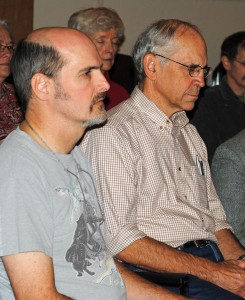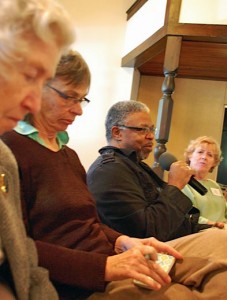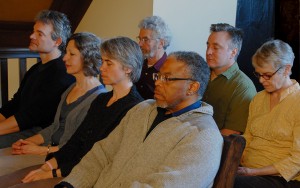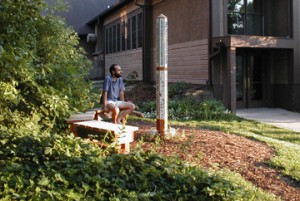Minneapolis Friends Meeting has no pastor. We meet together in quiet worship to experience God directly. The silence is both an expression of our faith and a way of helping us to come into the presence of God. Scripture says, “Be still and know that I am God.” (Psalm 46:10) We believe that in the silence we can experience God. This silent communion is the heart of our time together.
Unprogrammed and Semi-Programmed Meetings
At Minneapolis Friends Meeting, our early meeting for worship each Sunday is unprogrammed, with no prearranged speakers or music. Our later meeting is semi-programmed, meaning that someone will present a short prepared talk and there will be some music, but much of the meeting will be spent in silent worship.
During the summer months we have only one meeting for worship each Sunday, alternating week to week between unprogrammed and semi-programmed. See the schedule for full details.
Preparation
Meeting begins when the first person enters quietly, sits down and turns his or her mind toward God. When you’re settled comfortably, start to “center” yourself. Try to tune out the sounds of the world around you and the lively thoughts in your mind, in order to feel the presence of God within. This is not so much a matter of being silent, as of being still.
Soon you might feel a sense of “gatheredness,” an awareness that you’re in the midst of a prayerful community. Friends have always believed that the key to worship is quiet listening and waiting. We try to still the voices of our own minds and thoughts and listen instead to what God is saying, remembering that many messages don’t come to us in words. Remember that the deepest meetings might be mostly or entirely silent.
Don’t worry about distracting thoughts. Try, if only for a moment, to be quiet in body, mind and spirit. This stillness might clear the way for a sense of God’s presence. If you feel unfocused, take strength from those around you. Let their quiet reverence help you to feel calm and focused. Remember that we can draw each other closer to God.
Spoken Ministry
In unprogrammed Quaker worship, we seek to put aside the thoughts and cares of everyday life and listen instead for what God might be saying to us, both individually and as a group. Sometimes we might be led to share our thoughts aloud; at other times, God’s word is for us alone. We must pay attention to the difference. Friends’ worship is not an encounter group, a discussion or an exchange of pleasant thoughts.
The spoken ministry that arises out of the silence can come from anyone in the worshipping group. No one can tell in advance whether he or she will be moved to speak, but all should be open to the possibility.
 If a person feels the urge to speak, then a process of discernment or “testing” is necessary. The traditional advice is to resist speaking as strongly as one can, and to speak only if remaining silent would be disobedient to God’s call. Is God really asking me to speak aloud the words that have formed in my mind? Do these words arise from this meeting for worship as a spiritual insight, or are they instead a personal concern that should be shared in another way? Should these words be “seasoned” within me for a time, to be shared later when they’ve had a chance to blossom more fully? In the old days, this testing process was called the “exercise” of the meeting.
If a person feels the urge to speak, then a process of discernment or “testing” is necessary. The traditional advice is to resist speaking as strongly as one can, and to speak only if remaining silent would be disobedient to God’s call. Is God really asking me to speak aloud the words that have formed in my mind? Do these words arise from this meeting for worship as a spiritual insight, or are they instead a personal concern that should be shared in another way? Should these words be “seasoned” within me for a time, to be shared later when they’ve had a chance to blossom more fully? In the old days, this testing process was called the “exercise” of the meeting.
If you’re uncertain whether to speak, consider the following:
- Wait for a time in silence to see how the insight changes. Some Friends wait through several meetings for worship before sharing their leading.
- Ask whether the insight will serve the whole meeting or is meant for you alone.
- Vocal ministry should be motivated by your own religious experience, rather than by a desire to respond to someone else’s message.
- Be certain that your ministry is spiritual and intended for worship. Personal or social concerns can be shared in other ways.
If, after waiting, you do feel called to minister aloud, remember these guidelines:
- Never speak immediately after someone else. Friends need a chance to absorb the previous message. You might be surprised to find that your message changes during this waiting period – what you share eventually might be quite different from what you had intended at first. You might also find that your need to speak fades away entirely.
- Please stand if you’re able and wait for someone to bring you the microphone. Although you might feel you can speak loudly enough, some people who are hard of hearing use wireless headsets that pick up only what is spoken through the microphones.
- Speak briefly and only once. A few heartfelt words are better than a long explanation.
Those who don’t participate in vocal ministry serve the meeting through silent prayer and attentive listening. If your reason rejects the words of someone’s message, let your heart find the spirit behind the words. Keep in mind that the message might speak deeply to someone else in the group even though it doesn’t speak directly to you.
Seeking Balance in Worship
Meeting for worship, therefore, has two parts: the silent worship and the spoken ministry. We listen closely to God by seeking to be still in worship and by turning over in our minds the ministry that is given aloud. It’s not always easy to maintain harmony and balance between the silence and the spoken ministry, but it’s important to be always mindful of the responsibility.
Additional thoughts and guidance about speaking from the silence


